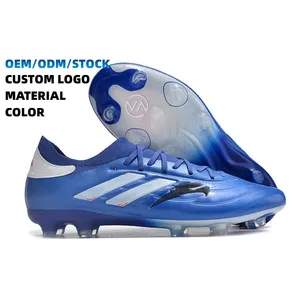














Related Searches:
























Top categories
About guitar cable to amp
Linking an electric guitar to an amplifier is a pivotal element in crafting music, and the guitar cable to amp serves as the essential conduit that not only facilitates this connection but also upholds the sound's authenticity. A guitar amp cord transcends a mere wire; it is a thoughtfully engineered channel that conveys the intricate audio signals from the guitar to the amplifier with scant loss or disruption.
Types of Guitar Amp Cords
A plethora of guitar amp cords exists, each tailored with distinct features to complement various playing styles and setup requirements. The spectrum ranges from conventional unbalanced cables to balanced varieties for settings prone to noise, with options including straight or angled jacks to suit the guitar's input jack location and the player's ease of movement. For those with acoustic-electric guitars, specific cables are crafted to retain the acoustic sound's purity while amplifying it. Discerning the subtle differences among these types can significantly affect tonal quality and performance ease.
Structure of Guitar Amplifier Cables
The guitar amplifier cable is a testament to intricate design, built to endure frequent usage while delivering superior signal transmission. At its core lies oxygen-free copper, responsible for signal carriage. Encasing this is a dielectric insulator, preserving signal fidelity. A conductive shield envelops the insulator, guarding against electromagnetic disturbances, and an external jacket offers resistance to wear and tear. This composite construction is meticulously assembled to ensure each note is conveyed with precision.
Materials and Their Properties
The selection of materials for amp cables for electric guitar hinges on their electrical characteristics and resilience. Oxygen-free copper is the preferred conductor for its exceptional conductive properties and corrosion resistance. Insulating and shielding materials are chosen to minimize signal loss and ward off interference, while the outer jacket is typically fashioned from robust rubber or textile to endure regular handling and coiling. Beyond functionality, these materials also present a variety of aesthetic choices for the meticulous musician.
Business Usages and Applications
In the realm of professional audio, the electric guitar amplifier cord is indispensable. Recording studios, live performance venues, and music education centers all depend on premium cables for pristine sound reproduction. In the studio, a cable's fidelity can be the deciding factor between a satisfactory recording and an exceptional one. Onstage, robust cables are crucial to withstand the dynamism of live shows. In educational contexts, dependable cables are key for students to accurately hear their instrument's sound.
Functions of Guitar Cables
The fundamental role of a guitar cable to amp is the faithful transmission of the guitar's electrical signal to the amplifier, preserving the sound's essence while curtailing noise and interference that could mar the music's purity. The cable's architecture, inclusive of its connectors and shielding, is optimized to achieve this purpose, ensuring the musician's creative output is authentically relayed through their gear.
Features of Guitar Amp Cords
Notable attributes of guitar amp with cord selections encompass low capacitance to maintain the guitar's tonal integrity; sturdy connectors that resist deterioration and ensure a firm connection; and cable jackets that are both pliable and resilient, capable of withstanding the rigors of being trodden on or contorted. Some cables also boast distinctive advantages such as gold-plated connectors for enhanced conductivity or integrated signal amplifiers for extended cable runs.
Benefits of Quality Guitar Amplifier Cables
Employing a top-tier guitar amplifier cable can markedly elevate a musician's experience. It eradicates the vexation of buzzes and hums due to interference, and its durable build diminishes the risk of cable failure at pivotal moments. For the audience, the reward is a pure, unadulterated sound that faithfully captures the performance's essence.
How to Use and Maintain Guitar Amp Cords
Proper usage and upkeep of a guitar amp cord involve careful handling and storage. When connecting, ensure the cable is securely inserted into both the guitar and amp jacks. Refrain from using excessive force that could harm the connectors. For maintenance, coil the cable loosely in a figure-eight to avoid kinks and store it in a place shielded from moisture and extreme temperatures. Periodically inspect for wear and address promptly to sustain peak performance.
Choosing the Right Guitar Cable for Your Amp
Choosing the appropriate amp cable for guitar requires contemplation of the instrument, the amplifier, and the setting in which they will operate. For electric guitars, a standard unbalanced cable usually suffices, but in electronically noisy environments, a balanced cable may be preferable. The cable's length should be the minimum necessary to prevent signal degradation while still allowing for mobility.
Cleaning and Installation of Guitar Cords
Cleaning a guitar cord for amp is a simple process. Disconnect the cable and gently wipe it with a dry cloth. For the connectors, a dab of contact cleaner may be used if needed. Installation is straightforward: plug the cable into the guitar and amp, ensuring a tight fit to maintain a stable connection.
Target Audience and Their Preferences
The intended market for guitar amplifier cords spans musicians at all expertise levels, from novices to seasoned professionals, as well as audio technicians and music producers. Each segment has particular requirements, from the durability and sound clarity for touring artists to adaptability and noise immunity for studio technicians. Manufacturers cater to these diverse needs by offering an extensive array of cables to satisfy the music industry's varied demands.
What are the key considerations when selecting a guitar cable for an amplifier?
In selecting a guitar cable to amp, pivotal factors to consider include the cable's length, material quality, shielding type, and connector durability. It's also vital to account for the specific demands of your performance environment, be it studio sessions or live gigs, to ensure the cable withstands the demands of usage.
How does cable quality impact the sound of an electric guitar?
The caliber of an electric guitar cable to amp profoundly influences the sound by dictating the signal's clarity. A high-caliber cable guarantees minimal noise and interference, safeguarding the guitar's tone and boosting overall sound quality. Conversely, inferior cables can lead to signal fidelity loss, introducing unwanted noise and degrading the audio experience.
Can the same cables be used for different instruments?
Indeed, the same electric guitar amplifier cable can typically be utilized for various instruments with compatible 1/4" jack inputs, including electric basses, acoustic guitars with pickups, keyboards, and other line-level devices. Nonetheless, it's crucial to select a cable with an appropriate length and quality for the instrument and its usage context.
Discover an extensive selection of guitar amp cords on Alibaba.com, where you can find the perfect connection solution for your musical instruments, customized to your unique needs.





























